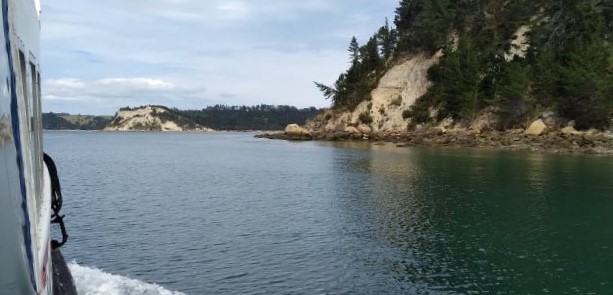Usually I am a very tidy sleeper. I barely disturb the bedclothes.
Not so last Saturday night after I'd received word of the death of my dear, dear old friend, Allan. I was filling in for one night as a house-sitter at One Tree Point, right on the harbour. I pulled back the curtains and spent most of the night gazing out at the harbour watching the lights go out on the other side of the harbour until finally it was just the channel markers blinking in the dark. I heard the waves gently lapping as the tide came in. I gave thanks that I was here by the sea as I grieved, as Allan had loved the sea and so many of our good times together were spent on or in the ocean.
Early morning, low tide
All night I tried to keep the sadness at bay, thinking of the fun times and concentrated on one night in particular. It was in winter in the late 80s or early 90s. I was 'keeping company' with Allan, who lived at Mangawhai by the sea not far from where I lived. During the summer months we had enjoyed floundering at night. Let me rephrase that – we enjoyed night-time flounder fishing the old fashioned away, with a spear.
We would wade in shallow water as quietly as possible along the estuary armed with a light held close to the surface of the water. The flounder is a flat fish which come into very shallow water - sometimes only inches deep - after sunset. Stalking shallow beach water and estuarine areas by night offers a totally different perspective to fishing. The fish life can be prolific, with mullet, eels and other creatures of the night more common than the skittish flounder, which can be difficult to see, camouflaged against the sand. When the light is shone on the flounder, they stay very still and should make an easy target. Well, you’d think it would be easy. More fun than easy really. Many flounder lived to swim another day.
When the nights became cooler Allan applied himself to thinking up a way we could still go floundering without having our feet in cold, cold water for hours. He came up with lamps that operated under water (maybe it was battery operated, I can’t remember) which we could suspend from the front of our kayaks. It worked well. In theory. In practise, I found it difficult to gauge the depth of the water while seated in the kayak rather than knowing how far up the legs it came while wading. I thought I was getting the hang of it when I spotted a BIG flounder and enthusiastically thrust the spear at it. However, the spear (with me holding on to the end of it) traveled much deeper into the water than I thought it would and I became unbalanced and tipped into the freezing water. OK, just very cold. But far too cold for me. I screamed and shrieked and then we laughed and laughed as we hurriedly hauled in the kayaks, got them on to the car and headed home for a much needed change of clothes and some warmth.
In those days Mangawhai had a permanent population of about 600 (which was much larger during the summer months) and houses close to where we had lunched the kayaks were all holiday homes. No lights, no-one around. So we presumed no-one was aware of our misadventure.
A few nights later we were visiting friends who lived on the cliff above the estuary but quite some distance from where we had been. After a while the man said we should have been at their place during the week. He and his wife had been watching TV when they heard a blood curdling scream above the sound of the TV. It came from down on the water and they were alarmed, wondering what on earth was going on down there. They thought someone was having their throat cut or something equally terrible. But after a while they heard laughter and voices. They thought the laughter sounded familiar but hadn’t been able to work out who it belonged to. Allan and I didn’t say a word but must have exchanged a look, or perhaps a smile because they then remembered whose laugh it was they had heard. We had forgotten how sound travels on the water on a still night.
Ahh, Allan, what good times we had!
He will have a funeral service in Australia where he has lived for many years and then his Kiwi family will scatter his ashes in the sea at Piha, a beach he loved so much.
Scatter his ashes on the sea
And as he floats
on crested wave
He wants no tears or grief
Or duty visits to
his grave.....
Don't bury him beneath the ground
No cold
imprisoned tomb for him
Or headstone with an earthy mound
That's
not the place he'd want to be.
It's where the winds blow fresh and free
I know
that he will lie content
The sea he loves his cemetery
And
waves his only monument.....
 l
l.jpg)
.jpg)
.jpg)




